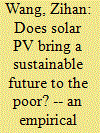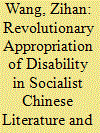| Srl | Item |
| 1 |
ID:
175003


|
|
|
|
|
| Summary/Abstract |
Improving the socioeconomic status of poor households has always been considered as an effective method to the help poor out of environmental inequality, but there is little literature to prove whether poverty alleviation measures can also have environmental deprivation for the poor. In this study, we explored whether the Chinese government's efforts for the poor to escape poverty can achieve environmental sustainability, and whether photovoltaic poverty alleviation projects (PPAP) can alleviate regional poverty while avoiding environmental deprivation. In order to find if the government's attempts to protect the environment and reduce poverty are effective, we evaluated in this article the impact factors of China's anti-poverty policy on the environmental sustainability in rural poor areas from the perspectives of poor households' environmental awareness and surrounding eco-environment. The methods used in this article are Entropy Weight Method (EWM) and Stochastic Frontier Analysis (SFA). The results show that only anti-poverty policies related to education and sustainable agriculture have positive impacts on rural environmental sustainability. The direct effect of photovoltaic poverty alleviation policy on environmental sustainability in the poverty-stricken areas from a micro perspective is not optimistic. Poverty alleviation projects related to renewable energy should consider increasing the participation of poor households. Based on the conclusions of this study, we have proposed corresponding policy recommendations.
|
|
|
|
|
|
|
|
|
|
|
|
|
|
|
|
| 2 |
ID:
171402


|
|
|
|
|
| Summary/Abstract |
The solar photovoltaic poverty alleviation project (PPAP) is an important innovation in China's targeted poverty alleviation (TPA) mission. Through investment in the renewable energy industry and an emphasis on poverty alleviation in rural areas, China's TPA has achieved great success. Although China has invested large amounts of money in PPAP, its actual contribution to rural poverty alleviation has not been verified. This paper analyzes the contribution of PPAP's efficiency in TPA via data envelopment analysis (DEA) and grey relation analysis (GRA). The results show that: 1) the overall efficiency of TPA is high; 2) the overall efficiency of TPA has large geographical differences; 3) the inputs of TPA have a great impact on the efficiency of poverty alleviation; and 4) China's investment in PPAP is indeed effective, but its impact on poverty alleviation is overestimated. Therefore, we propose four policy recommendations: 1) the scale and proportion of financial investment in TPA should be optimized; 2) local governments should allocate poverty alleviation funds according to local situations; 3) the Chinese central government should strengthen macro control and reduce support for PPAP; and 4) local governments should balance the allocation of funds for PPAP and other poverty alleviation projects.
|
|
|
|
|
|
|
|
|
|
|
|
|
|
|
|
| 3 |
ID:
181899


|
|
|
|
|
| Summary/Abstract |
Literature and film in socialist China represented disabled people primarily in two ways: either as courageously contributing to socialist development in spite of physical impairments, or as recovering miraculously due to the medical practices supported by the Chinese Communist Party (CCP). This article seeks to provide a more nuanced understanding of these two narrative paradigms. In the first case, it examines a mutually constitutive structure of love and disability, and then demonstrates how writers maintained a certain agency under socialist censorship by deviating from this structure. In addition, this article traces the formation of miraculous recovery stories and argues that this process was a complex interaction among disability, Soviet or Chinese medical practices, Sino-Soviet relations, and the Mao cult. I will further explore why the second paradigm became more influential than the first one during the Cultural Revolution.
|
|
|
|
|
|
|
|
|
|
|
|
|
|
|
|